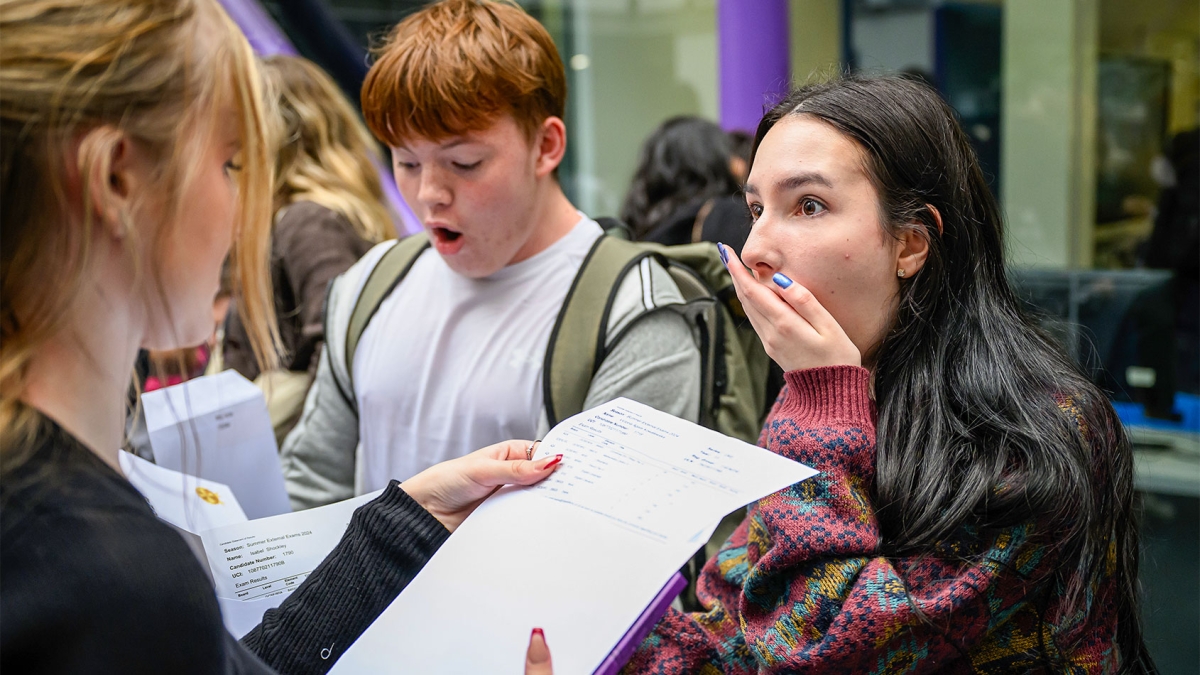Choosing between IGCSE and GCSE feels like standing at a fork when you pick subjects, especially if you are eyeing some of the Hardest GCSE Subjects such as Further Maths or Chemistry. You ask whether the international syllabus is less dense, whether exam papers, grading, and mark schemes make one route easier, or whether coursework and practicals change how hard a subject feels. This guide explains syllabus depth, assessment types, exam style, and revision strategies so you can choose the route that helps raise your grades and manage your workload.
To help with that, Ucademy’s online tutoring UK connects you with tutors who know exam boards and past papers, who will target weak topics, sharpen exam technique and build a clear revision plan to improve your results.
What is the IGCSE?

The International General Certificate of Secondary Education (IGCSE) is a globally recognized academic qualification targeted at students aged 14 to 16, typically studied over two years. It serves as an international equivalent to the UK’s GCSE, designed to prepare students for further academic pursuits such as A-Levels or other pre-university programs.
The IGCSE curriculum encompasses a diverse range of subjects, including mathematics, sciences, languages, and humanities, offering a balanced education with an international perspective that fosters both knowledge and practical skills. This qualification is highly respected worldwide and serves as an essential credential for students progressing to higher education or employment.
IGCSE Curriculum Overview
The IGCSE curriculum is noted for its broad and balanced approach, covering a diverse range of subjects including languages, humanities, sciences, mathematics, creative arts, technical, and vocational disciplines. This wide selection allows students to tailor their studies to their interests and future career aspirations. The curriculum places a strong emphasis on practical skills, including critical thinking, problem-solving, communication, and research techniques. These skills prepare students not only for further education but also for the real-world challenges and opportunities that lie ahead.
Global Reach of the IGCSE
More than 10,000 schools across over 160 countries offer the Cambridge programs and qualifications that include the IGCSE. Its widespread adoption spans regions like Hong Kong, where students can take exams through local authorities or international boards; Macao, where English-medium schools use the curriculum; Singapore and Malaysia, predominantly in international schools as an alternative to national exams.
The United Kingdom, mainly in private schools; the United States, with select schools and homeschooling families adopting it for its rigorous curriculum; and Italy, where several high schools participating in the Cambridge Schools Network offer IGCSE certifications accepted by some universities with specific grade requirements.
Flexibility and Levels
One of the salient features of the IGCSE is its flexibility. Students can choose a personalised pathway that aligns with their strengths and goals. Moreover, the curriculum is structured into two primary levels, Core and Extended. The Core level provides coverage of fundamental topics suitable for a broad range of learners. In contrast, the Extended level delves deeper into subject matter for students aiming for higher academic achievement.
Assessment and Recognition
Assessment methods under the IGCSE include written examinations, coursework, practical assessments, and oral tests, depending on the subject. The qualifications are internationally recognised by universities and employers alike, providing students with entry to numerous higher education institutions worldwide. This recognition underscores the value of the IGCSE as a credible and rigorous secondary education credential.
Benefits of the IGCSE
The IGCSE framework not only lays a strong academic base but also promotes independent learning, resilience, and time management. Its international orientation cultivates intercultural understanding and prepares students to be global citizens. The program’s focus on analytical skills and interdisciplinary learning equips pupils well for a variety of educational pathways and career opportunities.
Related Reading
- How Much Do GCSEs Cost
- How Many GCSEs Do You Take
- GCSE Grades Percentages
- How to Revise for Biology GCSE
- How to Prepare for GCSE
What is the GCSE?

The General Certificate of Secondary Education (GCSE) is a significant academic qualification in the UK, typically taken by students aged 14 to 16 during their secondary education. Established in 1988 as a replacement for the O Level exams, GCSEs have been the UK’s national high school qualification for over 30 years. They serve as a foundation for further education, such as A Levels, foundation courses, apprenticeships, and university admissions, with many institutions requiring minimum grades, especially in Maths and English.
GCSE Structure and Subjects
Students typically begin their GCSE studies in Year 10 and formally sit their exams at the end of Year 11, although some subjects may be taken at the end of Year 10. The curriculum mandates core subjects, including Maths, English Language, English Literature, and Sciences, with students choosing additional electives from a broad spectrum, such as History, Geography, Modern Foreign Languages like French, Spanish, and Italian, among others. The number of subjects taken usually ranges between four and eleven, depending on the school and student choices.
Assessment and Grading
Most GCSEs now use linear assessment, which means all exam papers are sat at the end of the course. Specific subjects still include controlled assessments, practical tests, or non-exam assessment components, such as art and design, as well as some science practical work. The grading system transitioned from letters to numbers, with nine being the highest and one being the lowest, to provide greater differentiation at the top end. Many subjects use tiered papers, categorized as foundation and higher, so students select the tier that matches their ability and target grade.
Picking Subjects and How Schools Structure the Programme
Schools establish a core of compulsory qualifications and then offer optional courses. The English Baccalaureate encourages a cluster of academic subjects that universities value, including English, maths, two sciences, a language, and either history or geography. Students choose between academic and vocational routes, depending on their skills and career plans. Timetabling and teacher expertise influence which exam board and which specification a school uses, which in turn affects the exact content and exam style.
Is IGCSE Easier Than GCSE?
Historically, IGCSEs were perceived as more challenging because they primarily relied on final exams, whereas GCSEs included coursework. However, since reforms in 2017, GCSEs now also emphasize final exams, making the assessment methods of IGCSE and GCSE very similar.
IGCSE and GCSE are both well-regarded qualifications for students aged 14 to 16, and each is designed to prepare learners for further academic study or employment, but they have subtle differences.
IGCSE syllabuses often take an international approach and can include a slightly broader set of topics in subjects like maths or geography; some maths papers include basic calculus or extra problem-solving that some students find more challenging. GCSE syllabuses often embed the UK context and set texts for English literature, including required Shakespeare, which shapes what students must study. Which syllabus matches a student’s strengths and interests matters more than the label.
Availability matters. International schools often offer Cambridge or Edexcel IGCSEs, while UK state schools use GCSE from various exam boards. Teachers familiar with a syllabus and a school’s support structure can make a big difference to outcomes. Think about exam board options, tiering in exams, resit policies, and your preferred learning style before you make a choice.
IGCSE vs. GCSE

Availability
GCSEs are the primary secondary school qualifications offered across the United Kingdom, including England, Wales, and Northern Ireland. Although Scotland predominantly follows a different system called National 5s, a few Scottish schools still administer GCSEs. Multiple exam boards, such as Pearson Edexcel, AQA, OCR, WJEC, and Eduqas, offer GCSEs, all of which are regulated by Ofqual.
This oversight ensures fairness, so no student gains an unfair advantage depending on the exam board chosen. In contrast, the IGCSE is regarded as the international counterpart to the GCSE. It is widely distributed in Commonwealth countries and other international schools worldwide. The IGCSE is primarily offered by Cambridge and Pearson Edexcel and is accepted by universities worldwide as being equivalent to GCSE qualifications.
Exam Dates
Both GCSE and IGCSE exams usually take place during the main UK summer examination period, which runs from May to June. There are opportunities for resits in November for both qualifications; however, IGCSE students benefit from an additional resit window in January. This flexibility with multiple exam sessions is beneficial for international students or those requiring more time to prepare. The coordination of exam and results dates across both qualifications follows the UK school calendar to ensure students receive their results simultaneously, maintaining parity in academic timelines.
Coursework Requirements
Historically, there was a clear distinction between GCSEs and IGCSEs in terms of coursework. IGCSEs were designed to rely heavily on final examinations, with minimal or no coursework, primarily to accommodate international candidates who might face language barriers. On the other hand, GCSEs traditionally included coursework components.
However, following reforms introduced in 2017, many GCSE courses reduced or removed coursework elements, making the assessment methods of GCSE and IGCSE increasingly alike. Consequently, the difference in coursework requirements between the two qualifications has become minimal, with both emphasising exam-based assessment.
Course Content
While GCSEs and IGCSEs cover similar subject areas, their syllabuses are tailored to different audiences. GCSE English Literature, for example, requires the study of Shakespeare, reflecting the UK-centric nature of its literature requirements. The IGCSE offers Shakespeare as optional material, reflecting its broader, international focus.
Similarly, subjects like History and Geography within the IGCSE curriculum present themes and case studies with a global perspective to accommodate the diverse backgrounds of international students. Despite these content variations, both qualifications aim to rigorously develop students’ knowledge, analytical skills, and critical thinking, ensuring excellent academic standards are maintained irrespective of geographical location.
Grading System
The grading systems between GCSE and IGCSE can sometimes be confusing. Since 2017, GCSEs in England have adopted a numerical grading scale from 9 to 1, where 9 represents the highest achievement, even surpassing the old A* grade. Interestingly, Cambridge IGCSE has retained the traditional A* to G scale. In contrast, Pearson Edexcel has aligned its IGCSE grading with the GCSE 9-1 system for consistency.
Despite these differing grading schemes, both qualifications are acknowledged nationally and internationally as equivalent by universities and employers alike. Therefore, students and educators can be confident that grading differences do not affect the recognition or value of their qualifications.
Grade boundaries and standard setting can impact pass rates and perceived difficulty, so consider comparing specific exam boards and past papers when assessing the difficulty. Which grade scale matters for your next steps?
Related Reading
- How to Pass GCSE Maths
- Is 7 a Good GCSE Grade
- How to Revise for English Language Paper 1
- How to Revise for Spanish GCSE
- How to Revise for History GCSE
- Bad GCSE Grades
Do Universities Prefer IGCSE or GCSE?

Universities do not generally prefer IGCSE over GCSE or vice versa. Both qualifications are widely accepted as equivalent by UK universities and other higher education institutions globally. The choice between IGCSE and GCSE has little to no impact on admission decisions as universities focus more on the student’s subject choices and their grades at this level.
The main distinction between the two lies in their focus and delivery. GCSEs are primarily designed for students in the UK, with a curriculum centered on British history, literature, and culture. In contrast, IGCSEs provide a more international perspective, with flexible subject options and content that appeals to a global student body.
For students planning to study in the UK, either qualification is suitable. However, international students or those aiming for universities outside the UK might find IGCSEs slightly advantageous because they are better recognized worldwide and often more suited to diverse educational contexts.
In essence, universities prioritize high academic achievement and relevant subject selections over the type of qualification. Both GCSE and IGCSE lay a solid foundation for A-Levels or other advanced studies required for university entry.
Key Differences in Exam Format and Assessment Style
- The IGCSE syllabus often uses global examples, while GCSE syllabi may include UK-specific content, such as British history or literature.
- Assessment methods, such as IGCSEs, sometimes use straight exam assessments; GCSEs have moved toward linear exams with less coursework.
- Exam boards, including Cambridge International, Edexcel, AQA, and OCR, set different question types and mark schemes, which influence how students prepare.
- Grading and grade boundaries vary year to year and by board, so two students taking the same subject under different boards can face different pass marks.
What Admissions Teams Actually Look For
Admissions teams generally search for strong grades in relevant subjects and a pattern of academic progress. They want proof you can handle advanced study and meet course prerequisites. Context counts too, in terms of your school's reputation, the exams available locally, and whether your performance aligns with typical grading in your system.
Practical Advice for Students
Select the syllabus that best suits your learning style and academic plans. Do the past papers for both the IGCSE and the GCSE versions of a subject to see which question style suits you. Speak to teachers about expected grade boundaries and how each exam board structures exams. If you aim to study outside the UK, ask target universities whether they have any preferences for specific boards or syllabi.
Questions to Ask Yourself Now
Do you need international recognition for university applications? Which subjects will support your intended degree? Answering these will produce a more straightforward path than worrying about labels alone.
How to Choose Your GCSE/IGCSE Subjects

Core Compulsory Subjects
In UK schools, the core compulsory GCSE/IGCSE subjects are English (including English Language and often English Literature), Maths, and Science. Achieving at least a grade 4 in English and Maths is required by law, with retakes mandated until passing. Science can be studied as combined or triple science, with triple science being particularly important for students interested in pursuing careers in medicine, engineering, or related fields.
Understanding the English Baccalaureate (EBacc)
The EBacc is a set of academic subjects designed to keep post-GCSE study options broad and university pathways open. It includes English Language and Literature, Mathematics, Sciences, a humanities subject (such as geography or history), and a language. Although not compulsory in all schools, there is an increasing push for students to take these subjects, with government targets aiming for 90% participation in state schools by 2025.
Optional Subjects and Their Groups
Beyond the core subjects, students choose optional subjects which fall into four main categories:
Arts
e.g., Art, Music, Drama
Technical
e.g., Design and Technology, Computer Science
Humanities
e.g., History, Geography, Religious Studies
Modern Foreign Languages
e.g., French, German, Spanish
Key Considerations When Choosing Subjects
Interests and Strengths
Selecting subjects that students enjoy and excel in will support better grades and motivation.
Future Plans
Consider intended career paths or university courses, ensuring prerequisite subjects (e.g., sciences for a medical career) are included.
Balanced Choices
Aim for a mix of academic, creative, and practical subjects to maintain a broad skillset and keep options open.
Exam Boards
UK GCSEs and IGCSEs are offered by five exam boards (Pearson Edexcel, CCEA, OCR, WJEC, AQA), each with slight variations. Knowing the board can help with exam preparation strategies.
Avoid Following Friends
Subject selection should be personal, based on goals rather than peer choices.
Guidelines on Number of Subjects
Typically, students take between 8 to 10 GCSE/IGCSE subjects. Quality and passion for chosen subjects usually matter more than quantity. Care should be taken not to overload with only “hard” subjects, which can be stressful, or only “easy” ones, which might restrict future options.
Importance of Planning Ahead
Choosing GCSE/IGCSE subjects thoughtfully prepares students for A levels, the International Baccalaureate (IB), university, and career pathways. Early consultation with school advisors or university counselors can help align choices with long-term goals.
Additionally, tutoring can be a vital part of planning ahead, especially for subjects that students find challenging or in which they wish to excel. Tutors provide personalized one-on-one support tailored to individual learning styles, helping students grasp complex concepts, refine their exam techniques, and boost their confidence.
Such targeted help not only enhances academic performance but also develops essential skills, including time management, critical thinking, and independent learning, which are crucial for success in further education and careers. With flexible scheduling and expert guidance, tutoring complements school learning, providing students with a strong foundation for their chosen subjects and future aspirations.
Ucademy’s proven British Curriculum methodology has helped thousands of students achieve top grades, with expert tutors from top universities like Oxford and Cambridge guiding them every step of the way. Ucademy takes the confusion out of GCSEs, A levels, 11+, and university applications by creating a personalised roadmap and providing the structured accountability busy parents need through online tutoring in the UK.
Book a Free Consultation Today | Free University Readiness Audit
Ucademy: Proven British Curriculum Support with Top University Tutors
Ucademy pairs a transparent British Curriculum methodology with tutors from leading universities, including Oxford and Cambridge. Thousands of students have improved their grades under tutors who are familiar with exam boards, mark schemes, and assessment objectives. Our approach focuses on specific exam skills and the content that examiners test most often.
Personalised Roadmaps and Structured Accountability
We design a tailored roadmap for GCSEs, IGCSEs, A levels, 11+, and university applications that matches your child's learning style and goals. Each plan sets milestones, schedules past paper practice, and assigns targeted revision for weaker topics. For busy parents, we provide regular progress reports and a structured framework that keeps study consistent and measurable.
How Do We Take The Confusion Out of Exam Choices and University Entry
Choosing between IGCSE and GCSE, picking exam boards, or planning A-level subject combinations becomes manageable with a clear action plan. Our tutors assist with subject selection, application statements, and interview preparation, enabling students to present strong university applications. Book your free consultation today to get your free university readiness audit and action plan.
How Ucademy Helps Students Beat the Most Challenging Subjects
We use targeted diagnostics to identify knowledge gaps, then schedule deliberate practice around past papers, mark schemes, and examiner reports. Tutors coach students on exam technique, timing, and the exact vocabulary that examiners reward. Sessions include model answers and live feedback, allowing students to refine their skills as they study.
Practical Next Steps You Can Take This Week
Compare two or three sample papers for the same subject from both IGCSE and GCSE, and time your child on one exam style. Ask teachers which format better matches your child s learning profile. If you want structured help, book your free consultation with Ucademy and receive a complimentary university readiness audit and action plan.
Related Reading
- How Important Are GCSEs for University
- How to Revise for GCSE in Year 10
- Best Revision Books for GCSE
- Best GCSE Subjects






